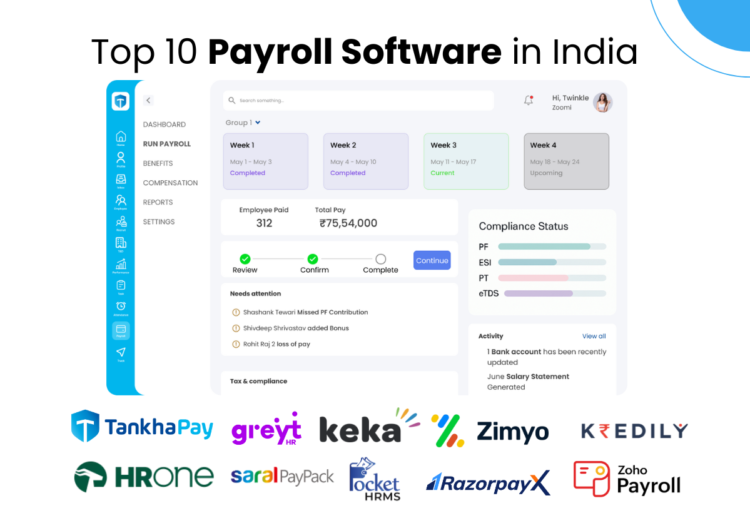In today’s fast-paced business environment, where employee retention and engagement are key to organizational success, the payroll process has evolved from a mere administrative task into a cornerstone of trust and transparency. For businesses in India, navigating complex labor laws, statutory compliances, and diverse workforce needs can make payroll a daunting challenge. Enter payroll software in India—a digital solution that’s revolutionizing how companies manage compensation while fostering deeper employee loyalty.
Payroll errors aren’t just numbers on a spreadsheet; they erode confidence and morale. According to recent insights from Deloitte’s India Human Capital Trends Report 2024, payroll errors account for an average of 5% of total payroll costs in India, leading to financial losses, compliance penalties, and a staggering 30% of employees expressing dissatisfaction when issues aren’t resolved promptly. Globally, Ernst & Young’s research reveals that around 20% of payrolls contain errors annually, each costing an average of $291 to rectify, but the real damage lies in the human element: nearly 49% of employees consider leaving after just two such mistakes. In India, where over 4.15 crore MSMEs employ 11.1 crore people, these discrepancies can trigger high turnover, legal disputes, and reputational harm.
This blog delves into how payroll software in India addresses these pain points, promoting accuracy, compliance, and openness. We’ll explore its mechanisms for building trust, highlight key features, and spotlight TankhaPay as a standout solution tailored for Indian businesses. By the end, you’ll see why investing in robust payroll software isn’t just a tech upgrade—it’s a strategic move for a motivated, transparent workplace.
The Payroll Predicament: Why Trust is Fragile in Traditional Systems
Imagine an employee logging hours diligently, only to receive a payslip riddled with miscalculated deductions or delayed PF contributions. Such scenarios aren’t rare in India, where manual payroll processes dominate smaller firms. The Ministry of MSME’s Annual Report 2023–24 underscores that manual handling amplifies errors in tax deductions and compliance reporting, often resulting in fines totaling Rs 627 crore in 2024 alone for late filings. These aren’t abstract figures; they translate to real-world fallout.
Payroll discrepancies breed distrust. A Remote Global Payroll Report 2024 survey found that 42% of employees experience a deteriorated relationship with their employer after a payroll issue, with 21% threatening public complaints or social media exposés. In India, where timely salaries are lifelines for many families, delays or inaccuracies spike anxiety and disengagement. A Paycom poll echoed this, noting that 1 in 5 Americans faced paycheck issues leading to financial stress like missed bills—trends mirrored in Indian workplaces, where 80% of errors are self-discovered by employees, amplifying frustration.
Transparency suffers too. Without clear visibility into earnings, taxes, and benefits, employees feel sidelined. Manual systems lack audit trails, making it hard to verify calculations or access historical data. This opacity not only burdens HR with endless queries but also signals a lack of accountability. As one HR expert from HR HUB notes, “Errors don’t just affect the company financially—they impact trust. An employee loses faith in the professionalism of the company if they discover that their pay has been miscalculated.”
The ripple effects are profound: reduced productivity, higher absenteeism, and turnover rates that cost Indian firms up to 1.5–2 times an employee’s annual salary to replace. In a talent-scarce market, where 67% of Indian companies are already adopting payroll automation to curb these issues, clinging to outdated methods is a risk no business can afford.
How Payroll Software in India Builds a Foundation of Trust
At its core, payroll software automates the tedious, error-prone aspects of compensation management, ensuring precision and punctuality. By integrating with HR systems, attendance trackers, and financial tools, it creates a seamless ecosystem that minimizes human intervention—reducing errors by up to 38%, per Deloitte.
Accuracy as the Bedrock of Reliability Gone are the days of spreadsheet blunders. Modern payroll software in India employs algorithms to handle complex calculations for salaries, overtime, bonuses, and deductions. It automatically factors in variables like arrears, loans, and reimbursements, ensuring every payslip is spot-on. Oracle India’s payroll insights highlight that this precision means “employees are paid the right amount and on time, every time, helping to build employee trust and confidence.” For a workforce expecting flawless execution, this reliability translates to peace of mind, curbing the 5% error rate plaguing manual processes.
Timeliness That Keeps Promises Intact Delays in salary disbursement are a top grievance, often leading to morale dips and attrition. Payroll software streamlines workflows, from data input to bank transfers, enabling same-day processing. ADP India emphasizes that “payroll software ensures that your employees are paid the right amount at the right time,” reducing enquiries and fostering a sense of dependability. In India, where labor laws mandate timely payments under the Payment of Wages Act, this feature isn’t optional—it’s essential for avoiding penalties up to Rs 50,000 per violation.
The trust multiplier? Consistency. When employees know their compensation is handled with unwavering accuracy, they focus on innovation rather than invoices.
Unlocking Transparency: Empowering Employees with Insights
Transparency isn’t a buzzword—it’s a trust accelerator. Payroll software in India equips employees with self-service portals, democratizing access to critical information. No more chasing HR for payslips or tax forms; instead, real-time dashboards reveal earnings breakdowns, leave balances, and benefit entitlements.
Self-Service Portals: Control in Employees’ Hands Platforms like those from Keka or greytHR allow 24/7 access to digital payslips, Form-16 downloads, and investment declarations. Techimply reports that this “enhances transparency and employee delight, lowering HR inquiries and fostering a positive workplace environment.” Employees gain autonomy, updating details like tax withholdings or viewing audit-ready trails, which builds confidence in the system’s fairness.
Audit-Ready Reporting for Accountability For HR and finance, detailed reports on PF, ESI, TDS, and LWF provide a single source of truth. Darwinbox, for instance, offers “automated record-keeping and real-time audit trails,” ensuring compliance while allowing employees to verify processes transparently. This visibility extends to mobile apps, where geo-fenced attendance and live tracking prevent disputes over hours worked.
The outcome? A 90%+ productivity boost, as seen in PeopleStrong implementations, where transparent payroll slashed processing time by 93% without compromising accuracy. When employees see the “why” behind their pay, trust flourishes—reducing turnover and enhancing engagement.
Navigating India’s Regulatory Maze: Compliance Without the Headache
India’s payroll landscape is a labyrinth of over 1,000 labor laws, from EPF thresholds to state-specific professional taxes. Non-compliance isn’t just costly—it’s a trust breaker. Payroll software in India embeds these rules, auto-updating for changes like revised TDS slabs, ensuring filings are effortless and error-free.
Zimyo and similar tools automate ESI, PT, and income tax declarations, minimizing the “chasing a moving target” frustration noted by HR HUB. This not only averts fines but reassures employees that their social security benefits are secure, reinforcing the employer’s commitment to their well-being.
Spotlight on TankhaPay: A Game-Changer in Payroll Software for India
Among the sea of options, TankhaPay emerges as a comprehensive, mobile-first HRMS and payroll platform, purpose-built for Indian MSMEs, startups, and enterprises. Backed by Akal Information Systems’ 25+ years of expertise, it transcends basic software with integrated services like Employer of Record (EOR), Apprentice Management under NATS, and managed compliance—slashing costs while scaling effortlessly.
Key Features That Drive Trust and Transparency TankhaPay’s automated payroll engine structures salaries with precision, handling advances, reimbursements, and statutory deductions (PF, ESI, LWF, TDS) in one dashboard. Its real-time attendance tools—geo-fencing, facial recognition, and shift management—feed directly into calculations, eliminating disputes. Employees love the multilingual app for self-service: downloading payslips, applying for leave, or tracking hours on-the-go, which reviewers praise for its “easy-to-use interface” and “feature-rich efficiency.”
Compliance is seamless, with auto-updates to regulatory changes and expert support for filings—users report it “makes payrolling and attendance a breeze” while ensuring PF/ESI access even for gig workers. For transparency, detailed reports on expenses, employee masters, and leaves provide audit-proof insights, reducing HR workload by automating routine tasks.
Real-World Impact and Reviews TankhaPay’s hybrid payment options (self-managed or auto) ensure timely disbursals, building the reliability employees crave. A Techjockey reviewer raved, “TankhaPay has truly simplified our payroll process… From onboarding to salary processing, everything runs smoothly. Highly recommended!” Another from SoftwareAdvice noted its role in “managing distributed teams with real-time access,” cutting errors and boosting satisfaction. For businesses outsourcing HR, its EOR model covers unorganized workers’ social security, fostering inclusivity and trust.
In a 2025 GetApp review roundup, TankhaPay scored high for scalability, with users appreciating how it “goes beyond software—it’s a strategic partner in workforce transformation.” Whether for factories, warehouses, or remote teams, it delivers 100% compliance and transparent workflows, proving that Indian-specific innovation can outpace global giants.
Case Studies: Payroll Software in Action
Consider Amara Raja Group, a conglomerate with 15,000+ employees. Using advanced payroll software like PeopleStrong, they achieved 100% processing accuracy and a 93% reduction in implementation time, directly enhancing employee experience and trust. Similarly, TankhaPay’s clients report 5x faster expense settlements and zero compliance penalties, crediting self-service portals for slashing queries by 70%.
These stories illustrate a pattern: Payroll software doesn’t just fix problems—it prevents them, turning potential distrust into enduring loyalty.
Conclusion: Invest in Payroll Software for a Transparent Tomorrow
In an era where employees demand more than a paycheck—they seek partnership—payroll software in India stands as a beacon of progress. By ensuring accuracy, timeliness, and openness, it mends the fractures of traditional systems, reducing errors that cost 5% of payroll budgets and erode 42% of employer-employee bonds. Tools like TankhaPay exemplify this shift, blending cutting-edge features with India-centric compliance to create workplaces where trust thrives.
For business leaders, the message is clear: Embrace payroll software today. Not only will it safeguard your finances and reputation, but it will empower your people, driving retention and growth. Ready to transform your payroll? Explore TankhaPay and witness transparency in action—your employees (and your bottom line) will thank you.


















